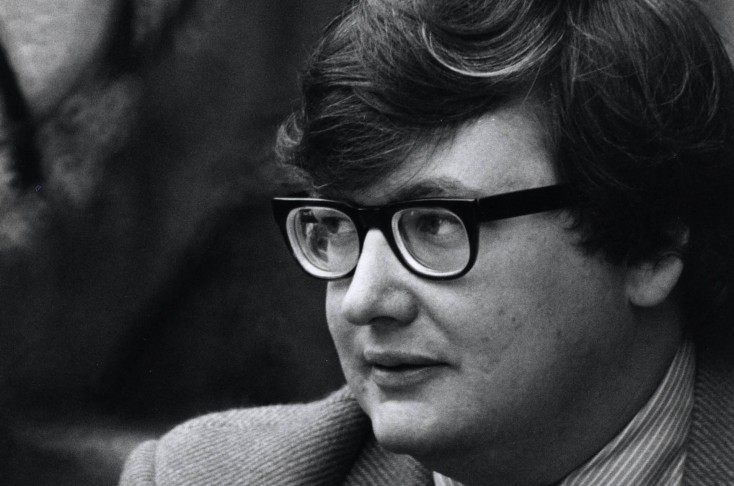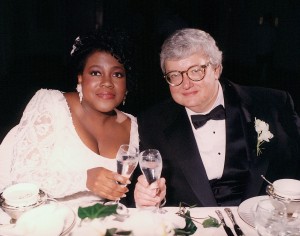By ANGELA DAWSON
Front Row Features
“Life Itself,” a touching documentary about legendary film critic Roger Ebert, makes its global television debut on CNN Sunday, Jan. 4 at 9 p.m. ET and 11 p.m. ET. Based on the 2012 memoir of the same title, the documentary tells the story of the Chicagoan who became one of the best-known and respected film critics of his generation.
The critically acclaimed documentary is directed by award-winning filmmaker Steve James, and features interviews with Hollywood luminaries who knew Ebert, including directors Ava DuVernay, Werner Herzog, Martin Scorsese (who also is a producer on the film) and others. Revealing details about the movies, his childhood, his drinking, his love life and his renowned professional rivalry with crosstown film critic Gene Siskel (who preceded him in death), a significant portion of “Life Itself” is told in Ebert’s own voice, both native and synthesized, with frank candor and optimism. It also shows a portrait of a happy marriage between Ebert and his wife Chazz Ebert, whose bond grew even stronger as the intrepid film critic battled cancer.
Since it premiered at the 2014 Sundance Film festival , “Life Itself” has garnered positive reviews and is gaining awards recognition. It was named Best Documentary by the National Board of Review, and is a possible Oscar contender.
Below is an interview with Ebert’s widow, Chazz, conducted by phone shortly before the film was theatrically released last year.
Q: This is a quite intimate portrait of a marriage as well as an account of your husband’s life. It was brave of you to do this because Roger chose to be a celebrity, but you married him and were a private person before this.
Ebert: Thank you. I have to tell you that we have this beautiful tribute to him. If I had known he was going to pass away, I don’t know if I would have started it. But I did know, I call it the universe talking to me, one morning I woke up after we had been approached by the representatives for Steve James and Steve Zallian, who did “Schindler’s List,” “Moneyball” and “Searching for Bobby Fischer.”
Their representatives contacted us and told us they were interested in making a movie from Roger’s memoir, “Life Itself.” We thought “Hmm.” We knew Steve Zallian and Steve James, and by that time, Martin Scorsese was attached to the project as an executive producer. We thought, “That’s a great team.” But Roger wanted to know why Steve James would want to make a movie about a film critic, and more importantly, how would he do it.
So we got Steve James in to talk to us. At that time, Roger was, medically speaking, as far as vital signs and all that stuff, was doing very well. The cancer had not recurred, or at least we didn’t know it had recurred. He was still going to movies every day and doing all this stuff so the point is we were going to make a movie about Roger doing all this stuff: giving dinner parties, giving speeches with a synthesized voice, going to film festivals, all of that. But he fractured his hip and for the next four months, except for two days, he was in the hospital. I don’t know we would have said yes. I’m glad that life didn’t telegraph that that was going to happen because then we wouldn’t have this beautiful portrait on the screen.
Q: Were you involved with the editing?
Ebert: No. What I was involved in was opening up our archives. The photos and clips and writing and calling people and telling them this is a project we wanted to see go forward and asking them to be candid and open and honest with Steve James as possible. Those are the things that I did.
Q: TV and film often glamorize cancer. In seeing this film, you get a sense of what it’s like to be there with someone who has it and the day-to-day stuff of what you go through. The reality of it all brought me to tears. I have to wonder, can you watch it objectively?
Ebert: No, I can’t, although sometimes I try to but it gets me every single time. Even when I try to put some distance between myself and the film, I can’t, because it’s such a beautiful and powerful film, and it’s about a man I love. I thought my husband was extraordinary. This is the man that I love so even though I try, it’s hard. I sit back and try to look at the cinematic elements of it—that I can do, a little bit. But the emotions of it are so overwhelming that they just suck me right in and the person who reads Roger’s words—Steven Stanton—the voice actor who does Roger’s voice is so good, that each time, I lose myself in it. I’m in a dream state. It feels like I’m hearing from Roger. It’s really hard to be objective about it.
Q: What was your objective on being part of the film?
Ebert: First of all, I thought Roger’s memoir, “Life Itself,” was so interesting and invigorating and showed so many different facets of his life. He talked about film and he talked about other things. He talked about his time in South Africa. He talked about a lot of stuff. So I thought, “Yeah, it actually could be cinematic.” I thought we were going to get a portrait similar to Roger’s memoir, and that it would be something people could see why Roger not only survived as a film critic all these years, but why he thrived and became a cultural icon, and why he became one of the most celebrated critics in the world.
Q: Did he talk to you about he felt about the state of film criticism in the Internet age?
Ebert: Yes, he did. He wrote an article about it. When people were bemoaning the loss about the power of the critic, Roger wrote an article called “The Golden Age of Film Criticism.” I don’t know how honestly he believed that, but he did believe that there could be a Renaissance in writing through the Internet. He was one of critics, early on, who went to bat for the right of Internet critics to be admitted into regular movie screenings, because at one time you had to be either a newspaper writer, a magazine critic, a weekly or daily publication critic, in order to attend the regular movie screenings. Today, with the proliferation of online criticism, it seems almost absurd to think of that, and with newspapers shutting down, or laying off critics, it’s completely changed. So, I remember Roger going to bat for online critics.
I remember James Berardinelli (a movie blogger) was the first online critic that Roger looked at his work and said, “This guy is really good.” He said, “They should have the right to see the films the same time I see them.” So Roger liked the democratization of the film criticism process. What he didn’t like were the people who didn’t want to put in time to develop a little more background so that they would have the substance to write about films the way the newspaper critics did, who came up through the system.
Q: You’ve managed to maintain Roger’s legacy with the Facebook page. Was that something you promised him you would continue or was that something you decided to after his death to honor him?
Ebert: I became the vice president of the Ebert Company in 1990, so for years I was involved in running the business, but always behind the scenes. People didn’t know me. So part of my job was going to movies and film festivals with Roger and because I had a big interest in movies and the business of it, I would keep up with things. In 2002, when we started Rogerebert.com, Roger and I co-founded that with the Chicago Sun-Times.
In 2013, when we were going independent so we could do a whole overhaul of our website, it was just natural for me to keep things going. Before he passed away, I think he knew he was leaving, even though we didn’t. I thought he’d have at least another two or three years. When he gave me the secret code to his password and Twitter accounts in March of 2013, he said, “Please, don’t close these accounts. Keep them going. Keep communicating with people.”
With the website, he thought he be around to run it with me. But he said, “If something happens to me, I want you to keep it going, but only if it makes sense for you to do so, but only if you have still have an interest in doing it. Don’t do it just for me.” So, I kept it going, partly for his legacy but also because it was something I liked doing. It was something I’d been doing for a long time. It’s also something I thought was necessary.
Some people ask, “With the proliferation of online critics, do we still need a single critic,” and I say, “We need them more than ever.” You need to have a place where you can go and get curated reviews that somebody’s paying attention to. Right now, that’s still what I think is necessary. Who knows what I’ll need next year. As I advance in the stages of grief and widowhood, I may decide I want to do something different. I just don’t know right now. I’m just taking it a day at a time.
Q: Gene was very private about everything until the end. Roger seemed to relish the public spotlight, even when he became ill.
Ebert: True. And the film really focuses on that. Even if we didn’t say anything about it, no editorializing about it, you can just see it. It’s there so plainly.
Q: The outtakes from the “Siskel and Ebert” show are great.
Ebert: They’re hilarious.






